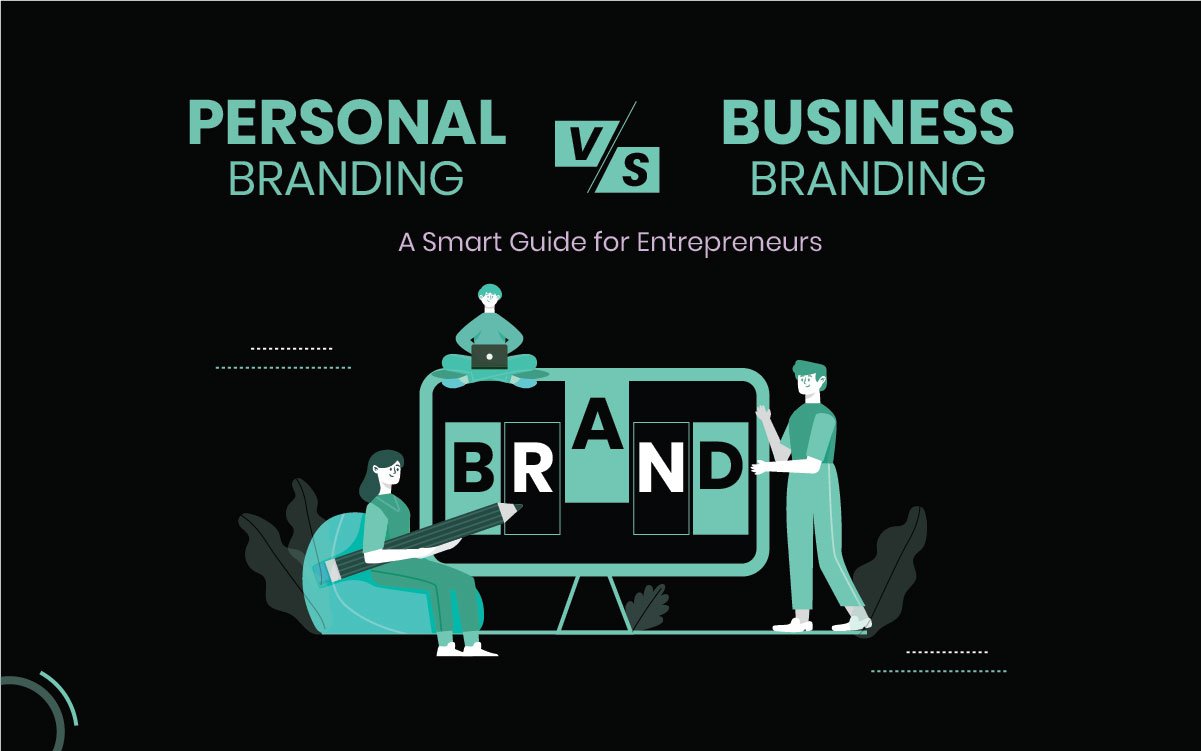
In the fast-paced digital economy, branding for entrepreneurs is more critical than ever. Whether you’re a freelancer, coach, or startup founder, how you present yourself or your business can make or break your success. The big question many early-stage entrepreneurs face is:
Should you build a personal brand or focus on business branding?
The answer isn’t one-size-fits-all. Both approaches come with unique strengths and challenges, and the best choice depends on your goals, industry, and long-term vision.
Let’s explore the differences, benefits, and ideal use cases for personal branding vs. business branding, and help you decide which one works best for you.
What is Personal Branding?
Personal branding is the art of marketing yourself and your career as a brand. Think of it as your professional reputation amplified.
Whether you’re a freelance designer, a mindset coach, or a thought leader, your name becomes your brand. People choose you based on your personality, experience, and expertise.
Benefits of Personal Branding
- Trust & Connection: People connect with people, not logos. Personal branding builds faster emotional rapport.
- Flexibility: You can pivot niches, services, or audiences without starting over.
- Thought Leadership: You can become a go-to expert in your space, opening doors to speaking gigs, podcasts, and media features.
- Low Barrier to Entry: Especially for freelancers or solopreneurs just starting out branding yourself is often cheaper and faster.
Drawbacks of Personal Branding
- Scalability Issues: It’s harder to delegate or exit a business that is built around you.
- Less Sellable: If your goal is to sell your business eventually, personal branding makes that trickier.
- High Visibility: Personal brands require constant presence and content creation. If you’re camera-shy or privacy-conscious, this may be draining.
What is Business Branding?
Business branding involves building a brand around a company name, product, or service rather than an individual. Think Airbnb, Notion, or Shopify. Even smaller ventures like niche agencies or SaaS tools benefit from business branding when structured correctly.
Benefits of Business Branding
- Scalability & Team Building: Easier to hire, delegate, and scale.
- Sellability: A well-established business brand can be sold or acquired.
- Professional Perception: Some industries (like B2B SaaS or fintech) expect a more corporate look and feel.
- Boundary Protection: Business branding can create a healthy buffer between your personal and professional life.
Drawbacks of Business Branding
- Slower Trust Building: Without a human face, it can take longer to establish trust with your audience.
- Higher Upfront Costs: You may need to invest in logos, websites, marketing teams, and customer support sooner.
- Less Agility: Pivoting a business brand may require full rebrands that are time-consuming and expensive.
Which One Works Best for Freelancers, Coaches, and Startup Founders?
Let’s break it down based on your role:
👤 Freelancers
- Best Fit: ✅ Personal Branding
- As a freelancer, you are the service. Clients want to know who they’re hiring. A strong personal brand gives you the edge.
- Pro Tip: Use a personal brand with a trade name extension (e.g., Jane Doe Creative Studio) if you want to build toward a team or agency model later.
🎙️ Coaches & Consultants
- Best Fit: ✅ Personal Branding (at first), then shift to business branding if you want to scale.
- Coaching is deeply personal. People choose coaches based on vibe and resonance.
- As your practice grows, you might build a team under a branded umbrella (e.g., Elevate Coaching Group).
🚀 Startup Founders
- Best Fit: ⚖️ Hybrid Approach
- In early stages, your personal brand can humanize the startup and help raise awareness.
- Over time, focus energy on business branding for growth, investment, and scalability.
- Example: Rand Fishkin of Moz used personal branding to grow the company’s visibility early on, then shifted to making Moz a standalone brand.
The Hybrid Branding Model: Best of Both Worlds?
More entrepreneurs are now adopting a hybrid branding strategy where the founder’s personal brand supports the growth of the business brand.
How It Works:
- Use your personal platform (LinkedIn, X, YouTube, etc.) to drive visibility, traffic, and trust.
- Simultaneously, develop a separate brand identity for your business that can stand on its own.
- Over time, shift the spotlight toward the business as it gains traction.
This approach provides flexibility and future-proofing. You can pivot, sell, or scale your business without losing the audience you’ve built personally.
Final Thoughts: Choose What Aligns With Your Goals
When it comes to personal branding vs. business branding, there’s no one “right” answer. Instead, ask yourself:
- Do I want to be the face of my business?
- Am I building something that could grow beyond me?
- Do I eventually want to sell or exit?
For freelancers and coaches, personal branding often provides a faster path to success. For startup founders, especially those in tech or product-based businesses, business branding offers more long-term scalability.
Ultimately, branding is about trust. Whether you put your face or your logo at the forefront, what matters most is delivering consistent value and building real relationships.
🔥 Action Steps for Entrepreneurs
- ✅ Define your long-term vision: personal legacy or business asset?
- ✅ Reserve domains and social handles for both personal and business names.
- ✅ Build a content strategy that supports your branding choice.
- ✅ Reevaluate every 6–12 months as your business evolves.
💬 What’s Your Branding Strategy?
Are you leaning into personal branding or building a business brand? Drop a comment below or share your story—we’d love to hear it!




Leave A Comment